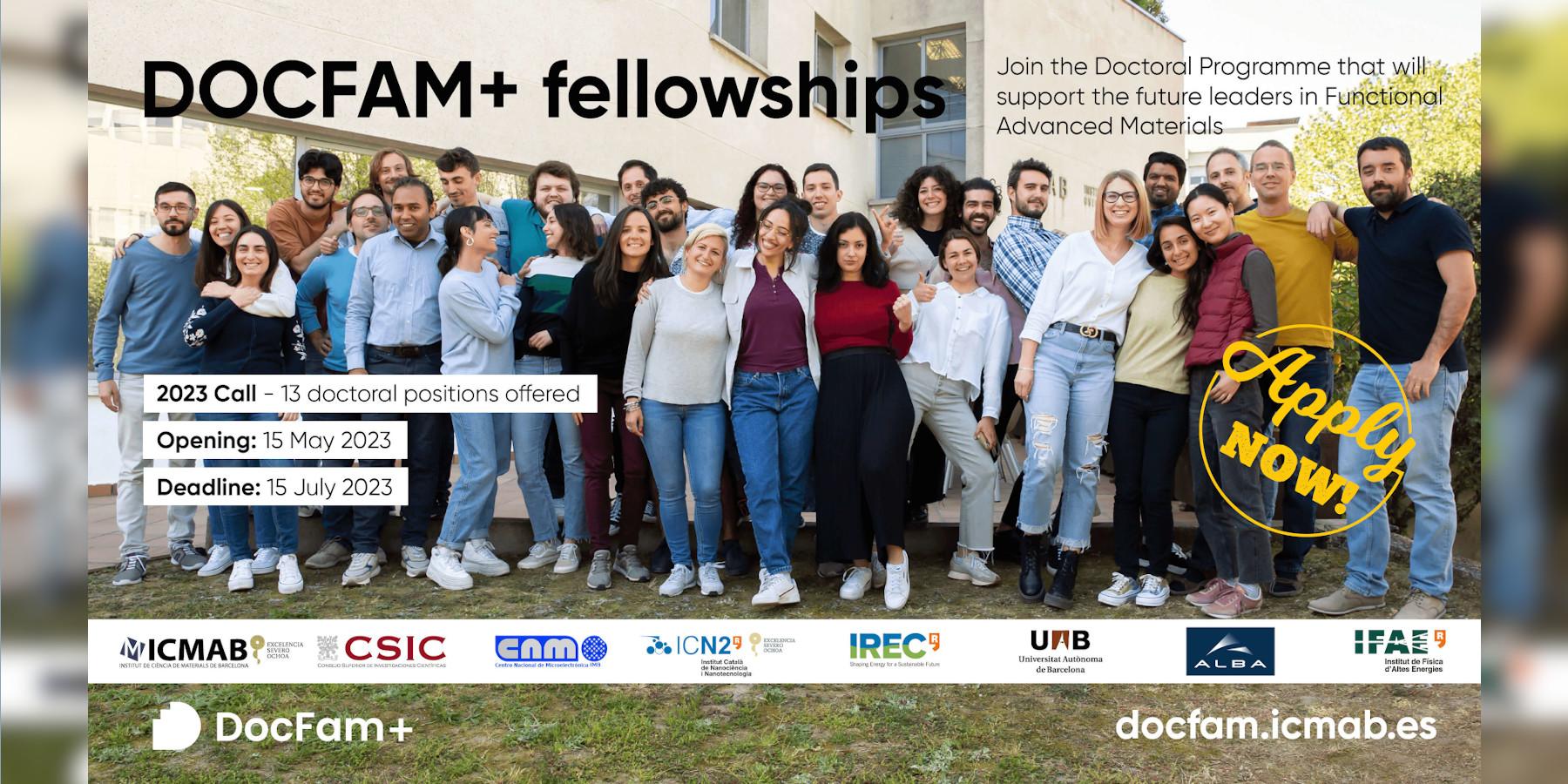13 places de doctorat Marie Skłodowska-Curie a la primera convocatòria del DocFam+
Avui s'obre la primera convocatòria de contractes de doctorat del DocFam+ (Doctoral training programme in Functional Advanced Materials) MSCA-COFUND coordinada per l’ICMAB-CSIC.

DocFam+ és un programa de formació doctoral d'excel·lència en Materials Funcionals Avançats de 5 anys de durada presentat pel Consell Superior d’Investigacions Científiques (CSIC) i coordinat a través de l'Institut de Ciència de Materials de Barcelona (ICMAB-CSIC) en col·laboració amb diverses institucions de recerca de la zona, sis de les quals contribueixen al cofinançament del programa: Institut de Microelectrònica de Barcelona (IMB-CNM-CSIC), Institut Català de Nanociència i Nanotecnologia (ICN2), Institut de Recerca en Energia de Catalunya (IREC), Institut de Física d'Altes Energies (IFAE), Universitat Autònoma de Barcelona (UAB) i Sincrotró ALBA.
DocFam+ establirà dues convocatòries per a contractar 26 futurs candidats a doctor Marie Skłodowska-Curie (MSCA) amb la finalitat de formar la pròxima generació de científics experts en la tecnologia clau i emergent dels Materials Funcionals Avançats.
En aquesta primera convocatòria, que obre el 15 de maig de 2023 i tanca el 15 de juliol de 2023, s'ofereixen un total de 13 places: 5 per l’ICMAB-CSIC, 2 a l’IMB-CNM-CSIC, 1 a l'ICN2, 2 a l’IREC, 1 a l’IFAE, 1 a la UAB i 1 al Sincrotró ALBA.
El programa inclou una àmplia gamma de projectes de recerca en el camp dels materials funcionals avançats, centrats principalment en tres àrees d'aplicació que responen als reptes més importants de la societat europea: Energia neta i segura, Nanomedicina intel·ligent i Electrònica sostenible i de baix cost.
El programa ofereix contractes de 36 mesos amb un salari per sobre dels estàndards nacionals. Els candidats contractats participaran, a més, en un complet programa de formació avançada que inclou competències transversals exigents orientades a la recerca i assessorament per al desenvolupament de la seva carrera professional.
Tota la informació relativa al programa, incloent-hi el procés de sol·licitud i avaluació, els criteris d'elegibilitat i els projectes de recerca disponibles en aquesta convocatòria, es pot trobar a la pàgina web del projecte.
Posicions obertes a l'IMB-CNM
Smart wound dressing materials with biosensing capacity (Xavier Muñoz & Gonzalo Guirado)
Open and surgical wounds are generally protected with bandages made of gauze, lint, plasters, or cotton that protect the injury from contaminants. This protection against pollutants is not very effective, and wound dressings are regularly replaced to avoid infections. However, it is quite common that, during the replacement, part of the already healed tissue is injured again, extending the recovery time. Although a more rational replacement of the wound dressing would be very convenient, it is not possible since current materials cannot report the state of the injury.
Keeping this problem in mind, the project aims to develop smart wound dressing materials with the capacity to report on the state of the healing process, as well as on potential problems associated with that, e.g. infections. To this end, multiple molecular probes sensitive to key physic-chemical parameters related to healing, inflammation or infection will be selected and implemented in the wound dressing material. Each probe will respond with a chromic change, being able to report on the parameter of interest through a simple colour change in situ, and without the need for reagents or sample manipulation. The colour of the smart wound dressing will thus inform on the state of the injury, e.g. healing, non-healing, infection, etc.
For a successful implementation of the project, the student will join the Chemical Transducers Group (CTg) at the Institute of Microelectronics of Barcelona (IMB-CNM, CSIC), a group with more than 20 years of experience in the development of sensors, biosensors and transducers and their implementation in textiles, filter membranes and flexible supports for wearables, among others. This project will be executed in collaboration with the Electrochemistry and Green Chemistry Group (EGCg) at UAB, which will support the student in the production of the molecular probes and their implementation in wound dressing materials.
Advanced wide band gap semiconductor devices for particle detection in high-energy physics and space applications (Joan Marc Rafí)
Semiconductor radiation detectors are widely used in high-energy physics, nuclear, space, security, and medical applications, providing excellent performance in terms of position and energy resolution. Apart from mainstream silicon devices, there is a growing interest in wide band gap (WBG) semiconductors, like silicon carbide (SiC), gallium nitride (GaN) and diamond for different and multidisciplinary research fields, this is especially due to their low leakage current, high transparency and potential radiation hardness. They are currently the most attractive materials for radiation detectors to be operated in radiation harsh environments and high-temperature conditions, like in future nuclear fusion reactors or space applications. Moreover, they will help in the simplification and sustainability of some applications currently implementing silicon devices, like high energy physics experiments, where cooling is needed to keep the functional operation of the detectors after high irradiation fluences, or medical applications, where visible light conditions and temperature variations greatly affect the silicon devices functionality.
The objective of this research will cover the design, simulation, fabrication and characterization of new developments in radiation sensors and microelectronic devices based on WBG semiconductors. Electrical characterization, as well as detector operation assessment under different radiation sources (alpha, beta, gamma, Xrays) and laser beams (transient current technique), will be performed in LabRad laboratory at IMB. Other physical characterization techniques like AFM, SEM, FIB, etc... are also available at IMB-CNM-CSIC Micro-Nanofabrication Cleanroom large-scale facility. Gamma, proton, electron and neutron irradiations, as well as test beam experiments, will be performed within existing European and international projects and collaborations of RDG Group, including, for example, ALBA Synchrotron, close to IMB and UAB Campus, and CERN in Geneva.
Contact
Dr. Laura Cabana Jiménez
Institute of Materials Science of Barcelona (ICMAB-CSIC)
Severo Ochoa Centre of Excellence
Carrer del Til·lers s/n, UAB Campus
08193 Bellaterra (Barcelona, Spain)
Tel: +34 93 255 7390; Email: lcabana@icmab.es




